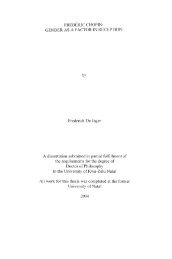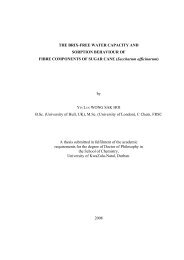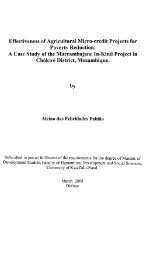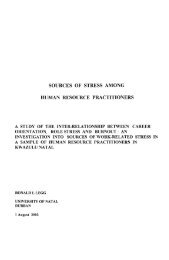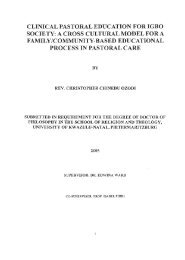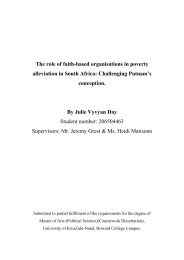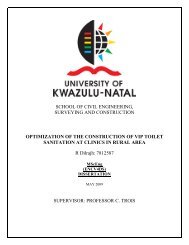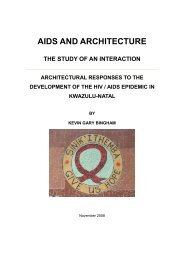View/Open - ResearchSpace - University of KwaZulu-Natal
View/Open - ResearchSpace - University of KwaZulu-Natal
View/Open - ResearchSpace - University of KwaZulu-Natal
Create successful ePaper yourself
Turn your PDF publications into a flip-book with our unique Google optimized e-Paper software.
Due to insufficient water supply, volunteer caregivers took at least their own 2 litres<br />
container <strong>of</strong> water and also had to go and fetch water from distant places rather than leaving<br />
their patients unattended to. These findings indicate inadequate and unequal supply <strong>of</strong><br />
government social services in the community and especially in home based care programs for<br />
PLWHA. Volunteer caregivers are already overburdened people thus carrying water<br />
increases their physical and psychological stress causing burnout and drop out implying that<br />
HBCOs could no longer provide quality services to its clients.<br />
Stigma results in blaming, shaming and loss <strong>of</strong> status in the stigmatised people (Deacon,<br />
2006:423). This study shows that some patients and family members did not want help from<br />
volunteer caregivers for fear <strong>of</strong> being stigmatised. To deal with stigma volunteer caregivers<br />
used their negotiation skills to persuade families and some patients to access their help. For<br />
the patients and family members who did not allow volunteer caregivers to use gloves, they<br />
were provided with education on the importance <strong>of</strong> using gloves. Volunteer caregivers also<br />
lied to their patients that they wore gloves to protect them from diseases this is consistent<br />
with Akintola (2005).<br />
To handle ridicules, volunteer caregivers ignored community members, family members or<br />
friends that ridiculed them and they continued to perform their work. They developed what<br />
Akintola (2008) called ‘a thick skin’. Volunteer caregivers also continued to educate family<br />
member on how to care for their patients. This shows a positive impact on (1) the patients in<br />
that they could continue to receive the help that they need from HBCOs through volunteer<br />
caregivers and their lives could be prolonged (2) HBCOs because it means that HBCOs could<br />
have volunteer caregivers that are dedicated to do their work meaning that these<br />
organizations will continue to function to meet their goals.<br />
69



